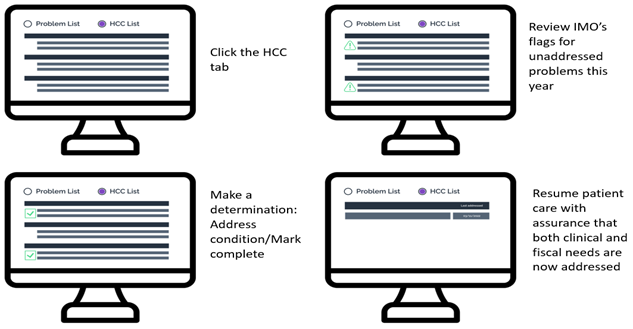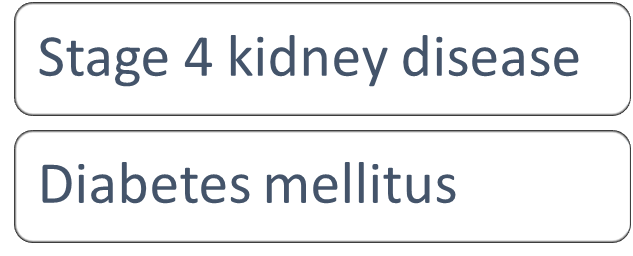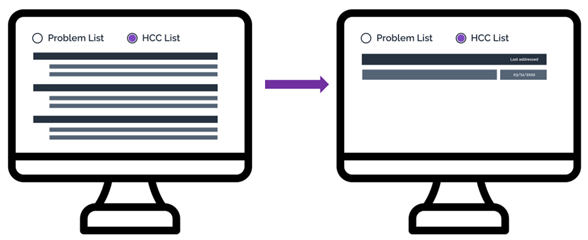Risk Assess
In this tutorial, we will employ the HCC Organize API to find and flag unaddressed Hierarchical Condition Categories (HCCs) in the problem list.
This capability is licensed under IMO Core.
What are HCCs?
As healthcare transitions to more value-based care, risk-adjustment models that reimburse providers based on their patient’s estimated future health costs are a growing part of many health systems’ payer mix. In these models, such as Medicare Advantage plans, certain conditions (i.e., HCCs) provide premium bonuses if addressed within the previous calendar year. These bonuses are based on the severity of the condition but are not paid if the provider does not submit a claim to document that the problem has been addressed. Therefore, it is incumbent upon providers to be able to identify when their patient has these conditions and code them with optimal specificity.
What problems can you address with this API?
Missed treatment opportunities and lost revenue impact all parties in the clinical sphere. That’s why the Risk Assessment API finds all persistent HCCs in the patient’s record and identifies those that are due to be addressed by the provider. This focused activity leads to timely care, optimum RAF scores and better outcomes, including:
- Continuity of patient care
- Identifying opportunities for care management services
- Optimum provider reimbursement

Setup
Start with a current problem list to check for risk assessment needs - i.e. HCCs that have not been addressed to date this year.
List example:
Problem List

Authentication
To call the Risk Assess endpoint, use the access token obtained from our OAuth2 authorization server.
How to: Call the Risk Assess API
This request will look for HCCs in the problem list and then flag categories that remain unaddressed within the calendar year.
Description: Look for unaddressed HCCs from the current problem list
The request must include:
- “type” – this can be a Problem or Diagnosis
- “last_addressed_date” – this date is used to calculate whether the Problem or Diagnosis is addressed or not.
Note: The request in this example is condensed to only show diabetes mellitus and not the full problem list.
Request:
curl --location --request POST 'https://api-sandbox.imohealth.com/problemlistmanagement/problems/risk-assess' \
--header 'Authorization: {{UPDATE_BEARER_TOKEN_HERE}}' \
--header 'Content-Type: application/json' \
--data-raw '{
"problems": [
{
"id": "1",
"title": "DM (diabetes mellitus), type 2 with neurological complications",
"type": "diagnosis",
"last_addressed_date": "2020-01-02T00:00:00Z"
}
]
}'
Response:
{
"unaddressed": [
{
"hcc_categories": [
{
"code": 18,
"title": "Diabetes with Chronic Complications",
"conditions": [
{
"last_addressed": "2020-01-02T00:00:00",
"lexical_code": "820168",
"lexical_title": "DM (diabetes mellitus), type 2 with neurological complications",
"preferred_lexical_title": "DM (diabetes mellitus), type 2 with neurological complications",
"icd10cm": {
"code": "E11.49",
"title": "Type 2 diabetes mellitus with other diabetic neurological complication"
},
"snomed": {
"code": "44054006",
"title": "Type 2 diabetes mellitus"
}
}
]
}
]
}
],
"addressed": []
}
Summary: Specialty categorize
- You sent a call to the Risk Assess API with a goal to find unaddressed HCC conditions in the problem list.
- The API searched the problem list and flagged the HCCs that still need to be addressed for the calendar year.
- You can now see the flagged HCCs (e.g.,
"Type 2 diabetes mellitus”), and you can make a plan for addressing those health conditions.
